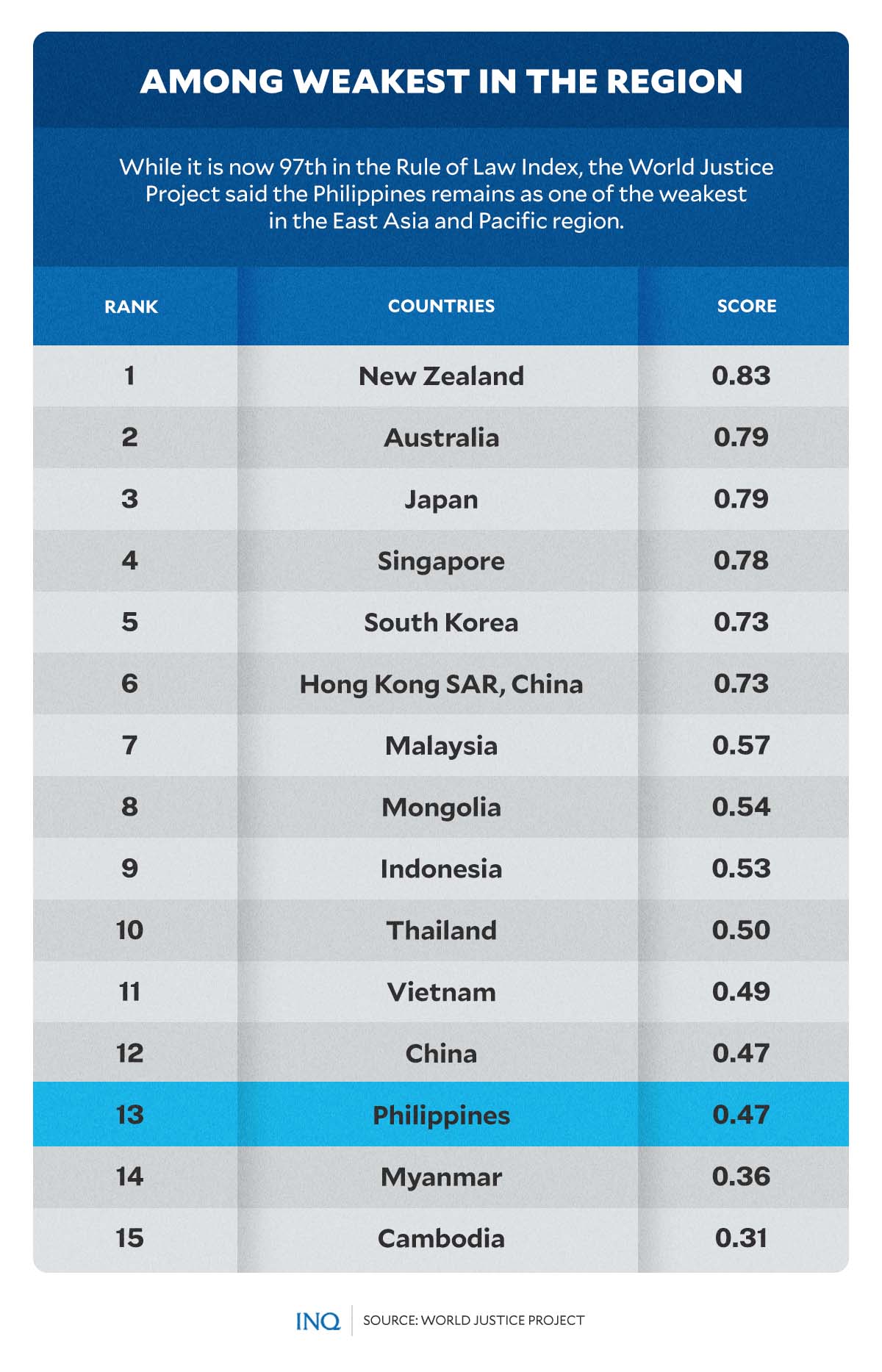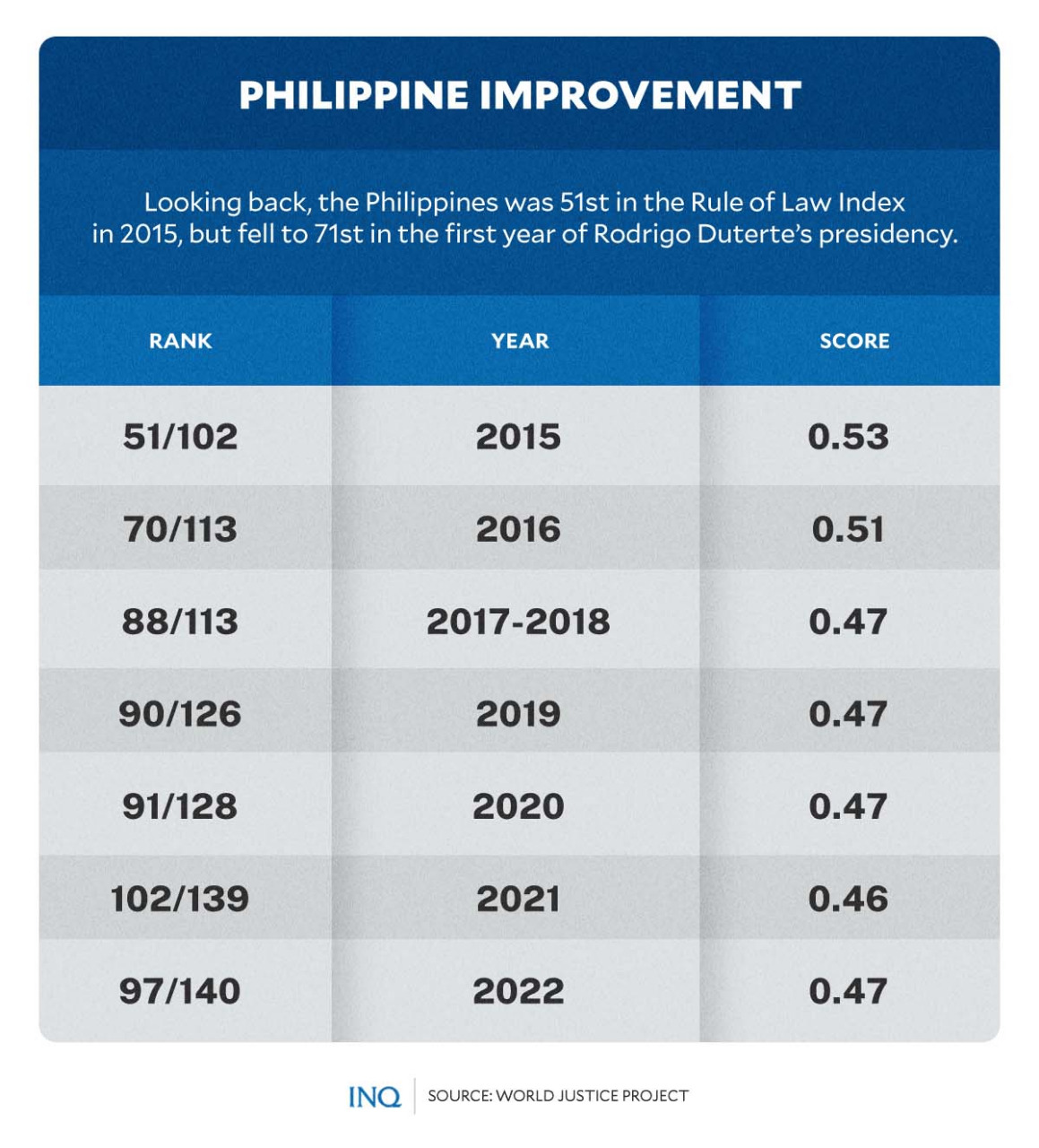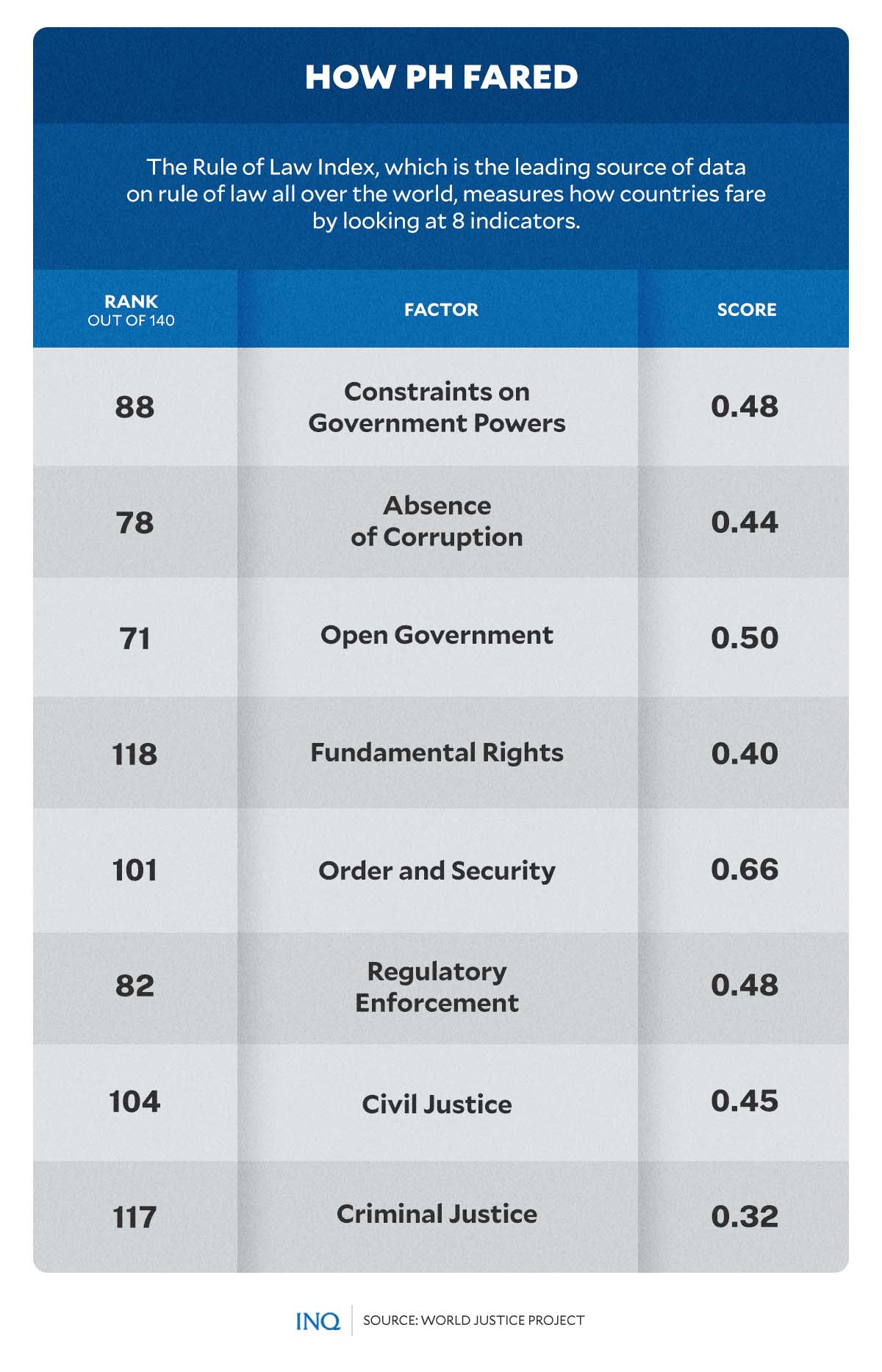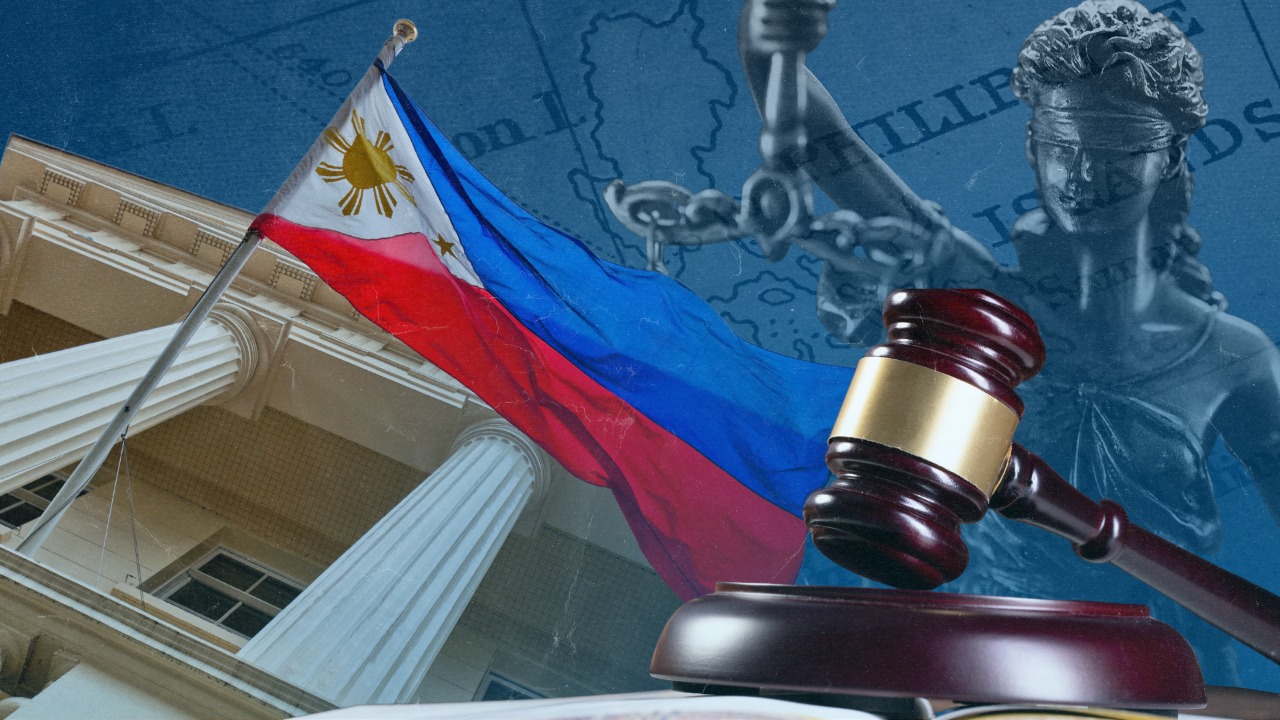Rule of law in PH: Ranking inches up, but situation ‘gloomier’
MANILA, Philippines—While the Philippines’ standing on the Rule of Law Index slightly improved this year, it still remains one of the weakest in the East Asia & Pacific region, the World Justice Project (WJP) revealed.
The WJP said while adherence to the rule of law fell to 61 percent—85 out of 140 countries—in 2022, the Philippines went against the trend as it leaped from 102 in 2021 to 97 in 2022, with a score of 0.47, slightly higher than last year’s 0.46.
READ: PH climbs to 97th spot in WJP Rule of Law Index 2022
However, even if the Philippines is now 97th, it remains one of the weakest in the region—13 out of 15—and was only ahead of Myanmar and Cambodia, which received a rating of 0.36 and 0.31, respectively.
To recall, the Philippines’s standing on the Rule of Law Index continuously fell when Rodrigo Duterte was president—from 51 (0.53) in 2015 to 70 (0.51) in 2016, 88 (0.47) in 2017 to 2018, 90 (0.47) in 2019, 91 (0.47) in 2020, and 102 (0.46) in 2021.
Based on the list, which measures countries’ adherence to the rule of law by considering eight main factors, the Philippines saw improvements in order and security (0.66 from 0.63), fundamental rights (0.40 from 0.39), and criminal justice (0.32 from 0.31).
Article continues after this advertisementREAD: PH ranks 102 out of 139 nations on rule of law
“Order and security” measures how well a society ensures the security of persons and property, while “fundamental rights” looks at how a society recognizes that laws should respect human rights. “Criminal justice” evaluates a country’s criminal justice system.
Article continues after this advertisementWith regard to the rest of the factors, the Philippines stayed stagnant—constraints on government powers (0.48), absence of corruption (0.44), open government (0.50), regulatory enforcement (0.48), and civil justice (0.45).
“Constraints on government powers” measures the extent to which those who govern are bound by law, while “open government” looks at the extent to which the government shares information and empowers people to hold the government accountable.

GRAPHIC Ed Lustan
WJP said “regulatory enforcement” measures the extent to which regulations are fairly and effectively implemented, while “civil justice” looks at whether ordinary people can resolve their grievances peacefully and effectively through the civil justice system.
‘Way down the ladder’
But while the Philippines’ standing slightly improved, lawyer Ephraim Cortez, president of the National Union of People’s Lawyers, told INQUIRER.net that “it is still way down the ladder.”
“Imagine, 88th in constraints on government powers, then way below in fundamental rights (118), order and security (101), civil justice (104), and criminal justice (117),” he said.
Cortez stressed that “these figures are much to be desired, as they reflect a gloomy situation of human rights, especially on the issue of rule of law.”
As stated by WJP, “the rule of law is a durable system of laws, institutions, norms, and community commitment that delivers accountability, just law, open government, and accessible and impartial justice.”
“These four universal principles constitute a working definition of the rule of law. They were developed in accordance with internationally accepted standards and norms, and were tested and refined in consultation with a wide variety of experts worldwide.”
WJP said Denmark is still first in adherence to the rule of law (0.90). Next to it is Norway (0.89), Finland (0.87), Sweden (0.86), Netherlands (0.83), Germany (0.83), New Zealand (0.83), Luxembourg (0.83), Estonia (0.82), and Ireland (0.81).

GRAPHIC Ed Lustan
The least, meanwhile, were Venezuela (0.26), Cambodia (0.31), Afghanistan (0.33), Congo (0.34), Haiti (0.35), Egypt (0.35), Cameroon (0.36), Nicaragua (0.36), Myanmar (0.36), and Mauritania (0.37).
New Zealand, with a score of 0.83, is leading in the East Asia & Pacific region. Behind it are Australia (.079), Japan (0.79), Singapore (0.78), South Korea (0.73), Hong Kong SAR (0.73), Malaysia (0.57), Mongolia (0.54), Indonesia (0.53), Thailand (0.50), Vietnam (0.49), and China (0.47).
Deeper look
Since “the index only captures a part of the situation [of rule of law] in the Philippines,” Cortez stressed that “a look at what is happening on the ground will show a gloomier situation.”
“The harassment of activists and political dissenters are intensifying, the latest are the arrest of three labor leaders, red-tagging remains to be a daily staple,” he said on Thursday (Oct. 27).

GRAPHIC Ed Lustan
Based on data from rights group Karapatan, 442 activists were killed in Duterte’s six-year presidency—July 2016 to June 2022—while 1,341 were victims of illegal arrest and detention.
READ: Badoy says red-tagging not dangerous but 427 slain activists show otherwise
WJP said there are “alarming trends” in promoting fundamental rights of individuals all over the world after core freedoms fell from 2015 to 2021.
The “alarming trends” include the unfair treatment of political opposition and the media, who the WJP said have been at the receiving end of “unreasonable searches, detentions, or threats, and abusive treatments.”
“We also remember the attacks on journalists, especially the assasination of Percival Mabasa, or Percy Lapid,” Cortez said, referring to the killing of Mabasa, who was shot in Las Piñas City on Oct. 3.
READ: Percy Lapid slay case not yet closed nor solved — PNP
As stated by WJP, 81 percent of 140 countries included on the list had lower scores in “freedom of opinion and expression,” while 85 percent also saw their scores in “freedom of assembly and association” fall.
“Authoritarian trends that predate the pandemic continue to erode the rule of law. Checks on executive power are weakening and respect for human rights is falling,” WJP Executive Director Elizabeth Andersen said.

GRAPHIC Ed Lustan
WJP stressed that “no matter who we are or where we live, the rule of law affects us all. It is the foundation for communities of justice, opportunity, and peace—underpinning development, accountable government, and respect for fundamental rights.”
